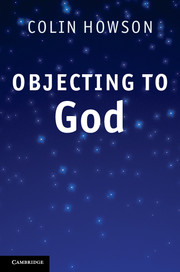Book contents
- Frontmatter
- Contents
- Preface
- Acknowledgments
- Chapter 1 Of human bondage
- Chapter 2 God unlimited
- Chapter 3 How to reason if you must
- Chapter 4 The well-tempered universe
- Chapter 5 What does it all mean?
- Chapter 6 Moral equilibrium
- Chapter 7 What is life without Thee?
- Chapter 8 It necessarily ain't so
- Bibliography
- Index
- References
Chapter 4 - The well-tempered universe
Published online by Cambridge University Press: 05 June 2012
- Frontmatter
- Contents
- Preface
- Acknowledgments
- Chapter 1 Of human bondage
- Chapter 2 God unlimited
- Chapter 3 How to reason if you must
- Chapter 4 The well-tempered universe
- Chapter 5 What does it all mean?
- Chapter 6 Moral equilibrium
- Chapter 7 What is life without Thee?
- Chapter 8 It necessarily ain't so
- Bibliography
- Index
- References
Summary
‘There are more things in heaven and earth, Horatio, than are dreamt of in your philosophy.’
In the beginning was the bang…
According to what is called the standard cosmological model, the universe exploded into existence over thirteen billion years ago and almost immediately expanded superluminally in a very brief inflationary period. As cooling continued, protons and neutrons fused into helium, deuterium and lithium nuclei, mixing with the electrons in a plasma too hot to allow the formation of stable atoms. The atoms themselves appeared after a few hundred thousand years, and after a billion years gravity acted on small variations in density to cause matter to clump together in stars and galaxies. Even before the inflationary epoch, cooling had broken the initial symmetry to give the four fundamental forces: gravity, the weak and strong nuclear forces and electromagnetism. After the very rapid initial inflationary period ended the rate of expansion of the universe fell under the predominating influence of gravity and dark matter, but after another five billion years the repulsive influence of dark energy preponderated and the rate of expansion again increased.
- Type
- Chapter
- Information
- Objecting to God , pp. 91 - 113Publisher: Cambridge University PressPrint publication year: 2011



